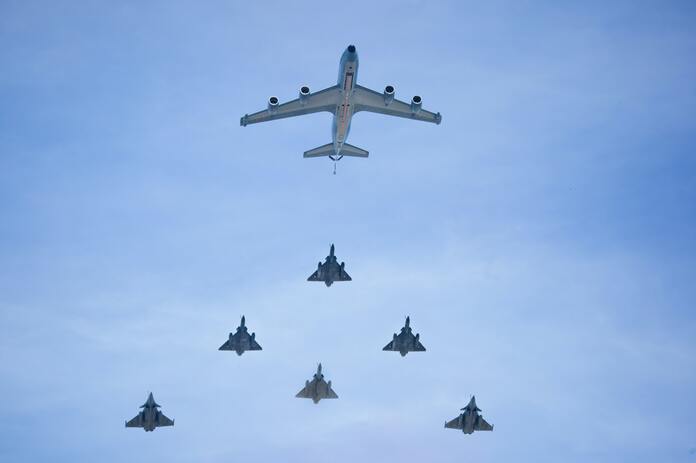Boeing Stock (NYSE:BA)
Airbus (OTCPK:EADSF) and Qatar Airlines are locked in a high-profile legal battle about surface issues with the Airbus A350. Qatar Airlines described the problem as a safety issue, however, Airbus and EASA investigations revealed that it is entirely cosmetic. As a result, both parties argued in court, and Airbus ended up canceling Qatar Airways’ whole Airbus A350 purchase, as well as the Middle Eastern airline’s Airbus A321neo order. In an August analysis, I stated that Boeing could benefit from the conflict between Airbus and Qatar Airways, but only if the two companies re-establish their relationships. This occurred in February of this year and was pretty predictable. I’ve gotten several messages claiming that this is a setback for Boeing (NYSE:BA), but as I explain in my analysis, I disagree.
The Consequences of the Airbus-Qatar Airlines Conflict
The repercussions of the conflict were significant at first. Airbus was enraged with Qatar Airways and canceled a total of 23 Airbus A350-1000 planes on order, which harmed the plane maker because the Airbus A350-1000 is not a quick seller and Qatar Airways is one of the Airbus A350’s largest customers. The European aircraft manufacturer also stopped canceling 50 Airbus A321neo planes that it could sell to other customers for a lower price. Nevertheless, I also mentioned a hypothetical relationship reset:
It is not true that Qatar Airlines can no longer obtain Airbus planes. If Airbus and Qatar Airways re-establish their connection, orders might be placed at new conditions, and there are indirect opportunities to lease Airbus aircraft, albeit there is likely to be a queue, as with Boeing deliveries.
That is exactly what occurred. With both aircraft manufacturers experiencing delays, Qatar Airlines must have realized that ceasing business with Airbus would harm its bargaining power in Seattle when acquiring Boeing planes. Furthermore, the ongoing delays at both manufacturers highlight the need of hedging airplane orders.
Qatar Airlines Reinstates Aircraft Purchase, According to Airbus
In the end, the evoX airplane orders monitor shows that Airbus and Qatar Airways agreed nearly a year after the issue occurred, with no loss of orders for Airbus. It’s possible that Airbus and Qatar Airways agreed on some form of compensation package as part of the reinstatement of the jet order, or that the airplane order is part of a compensation package.
Airbus Landed the First Blow
Qatar Airways is a difficult customer to please, and I can understand why. When you pay $150 million for an airplane, you expect it to be flawless in every way. One point that is frequently overlooked is that Airbus was the first to threaten legal action. With the pandemic wreaking havoc on demand for air travel and, by extension, commercial jets, Airbus simply threatened to sue airlines who did not honor their purchase commitments. I realize that you want to deliver jets as planned, but Airbus demonstrated very little understanding for its clients back then, and Qatar Airlines was negotiating aircraft deferrals at the time. The paint issue was not an isolated annoyance; it was an annoyance with the way Airbus handled its clients, including one of the largest Airbus A350 operators.
I also recall John Leahy bragging about the company’s continuous growth in airplane deliveries when compared to competitor Boeing. That was before a delivery halt for the Boeing 737 MAX or the Boeing 787, and it failed to understand one reality: during economic downturns, Boeing accommodated deferral requests at a higher rate than Airbus. Hence, while Airbus boasted about its consistency and market penetration, the reality was that it showed little regard for its clients.
Boeing Only Had So Much Room to Win Jet Orders
In the long run, the Airbus-Boeing disagreement may result in greater sales for Boeing. Yet, the fact was that the upside to airplane purchases was fairly limited in the short term. The intention to postpone deliveries is exactly what ignited the conflict between Airbus and Qatar Airways. As a result, Qatar Airlines is unlikely to order considerably additional planes.
Aside from that, there may be interest in three aircraft programs: the Boeing 777X, the Boeing 737 MAX, and the Boeing 787. In reality, each of these programs is experiencing delays. The Boeing 737 MAX cannot be manufactured quickly enough, while the Boeing 787 has been plagued by quality concerns, resulting in a delivery halt and the Boeing 777-9 passenger plane has been delayed for years. Hence, while the Boeing 737 MAX had a genuine chance of replacing the Airbus A321neo order, the Airbus A321neo product and the Boeing 737 MAX 10 product are not nearly similar. Additionally, Qatar Airlines had previously expressed interest in a freighter model of the Boeing 777X. So that’s where the only two feasible opportunities presented themselves. The controversy made it easier for Boeing to secure the freighter business because the Airbus A350F was no longer an option.
Qatar Airlines ultimately ordered up to 50 Boeing 777-8F jets, with 34 definite orders and 16 options. Twenty of the 34 solid orders came from discussions, while 14 were for new airplanes. Qatar Airlines has long envisioned becoming a much larger freight center, and the Boeing 777-8F orders, as well as the two freshly purchased Boeing 777Fs, fit into that strategy.
The airline recently agreed to buy 25 Boeing 737 MAX 10 jets with options on another 25 more. The main question, of course, is whether Qatar Airways will cancel its order for the Boeing 737 MAX right now, which I doubt. If anything, the conflict with Airbus should have taught Qatar Airways that canceling orders and placing all of your eggs in one basket is not a good idea. Qatar Airlines ordered the Boeing 737 MAX for its investment in Air Italy years ago. That airline ceased operations, and Qatar Airlines backed out of the contract, only to end up in a dispute with Airbus, which unilaterally canceled an unrelated purchase. It would be foolish for Qatar Airways to repeat the same error. Aside from that, airplane supply is currently constrained, with Airbus sold out until 2028. Qatar Airways will receive its first planes in 2026, three years later than expected.
The Boeing 737 MAX, on the other hand, is “only” sold out until 2026, providing Qatar Airways with earlier availability of fuel-efficient next-generation planes, and Qatar Airways has been able to secure some early slots because some planes originally destined for Russian airlines are now going to Qatar Airways. The introduction of the MAX 8 into the Qatar Airlines fleet is already scheduled for the next few months. To rationally add a new sub-fleet to the fleet, a considerable number of planes must be purchased, so I don’t understand why Qatar Airlines would be ready to cancel any of its Boeing plane contracts.
It should be noted that prior to the epidemic, the delivery flow to Qatar Airways was roughly balanced between Boeing and Airbus. According to the evoX Aircraft Sales Monitor, Airbus had a 52% percent of deliveries, while Boeing had a 52% share. As a result, Qatar Airlines’ aircraft acquisition strategy is apparent.
Who Has the Most A350 Aircraft?
Singapore Airlines (OTCPK:SINGY) now has the most Airbus A350s, with 61, followed by Qatar Airways, which owns 53. Without the conflict, Qatar Airlines would almost certainly have been the largest operator of the Airbus A350.
Which Stock Outperformed: Airbus or Boeing Stock?
We frequently see things framed in an Airbus versus. Boeing’s framework and certain events are portrayed as far larger than they actually are. The stock performance of Airbus and Boeing since the issue occurred demonstrates that you would not have lost with any jet maker, and Qatar Airways had no significant negative or positive impact on Airbus or Boeing stock prices. Boeing primarily underperformed due to rising defense program costs.
Conclusion: Notwithstanding the Boeing Blow, Airbus and Boeing Stock Still Buys
Although some argue otherwise, I don’t see why Boeing should be losing orders now that the Airbus-Qatar Airways disagreement has been resolved. In fact, the argument highlights the significance of diversifying orders among jet manufacturers. Qatar Airways will get the first MAX plane in the coming months, and with supply chain issues for both airplane manufacturers, it’s critical for a company like Qatar Airways to have access to deliveries from both OEMs, as it has for years.
Hence, I don’t anticipate a negative impact for either aircraft maker and continue to feel that Boeing and Airbus shares are long-term buys.
Featured Image: Unsplash @ snowjam

















